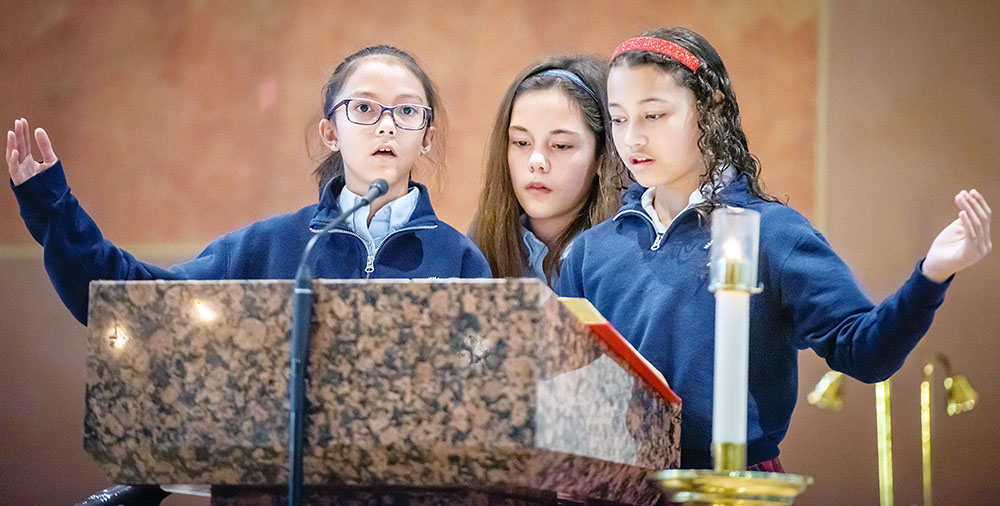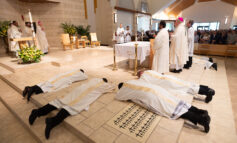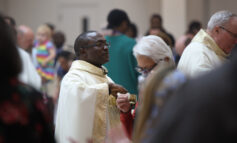
Fifth-graders Kindle Cudal, Joanna Jodziewicz and Liza Rojas Sanzonetti lead the responsorial Psalm during the school’s 60th Jubilee Mass at the Mary Immaculate Catholic School h in Farmers Branch, Texas, Saturday, Nov. 9, 2019. (Ron Heflin)
By Father John Bayer
Special to The Texas Catholic
People today are deeply affected by the challenges of unity and diversity, especially the younger generations. These challenges are a chance for the Gospel to show its power.
For some people, our society’s affirmation of diversity must be so uncompromising that truth and unity, and therefore community, become acceptable losses. I think this happens because diversity in our culture is inseparable from identity and personal value. So, some see the refusal to make diversity into an absolute idol as a personal threat. An example of this idolization of diversity is how adamantly some insist that sexuality and gender can be redefined and multiplied without any regard for biological reality. What matters to some is that their alleged difference is affirmed at all costs, even at the cost of truth and unity.
For some other people, our society’s affirmation of unity must be so uncompromising that it becomes difficult to see how they will justify respect for human freedom or ever find patience for our pilgrim journey toward the truth. This happens because unity is inseparable from power and security, and in this way it, too, is connected to identity. An example of this idolization of unity is how intolerant some people can become when someone expresses an opinion different than their own. It seems it is not as important to ask rationally whether the opinion is correct, or how one person can persuade the other. To some, it seems more important to shut down the other voice as soon as possible and in this way to ‘unify’ all speech.
Personal identity and value, freedom, truth and security – these are deeply existential questions, and we really should wrestle with them in the light of the Gospel if we want the Church to be authentic and to serve the world. People should be able to look to the Church for help. The Gospel really does meet the needs of the world.
The Gospel proclaims the Father, the Son and the Holy Spirit, three persons in one God, the unity in diversity that is the Trinity. Unity and diversity are “co-primordial” in God. He is not some monolithic “one” that unfolds in diversity at a later moment second to his true nature; nor is he some “three” who later try to steer their independence into a unity that is, in the end, only some addition to their fundamental identities apart from each other. The Father is Father of the Son from all eternity; he is Father eternally; as God, he was never not Father. Just so, each person of the Trinity is the one God and yet as the one God is diverse from the other two.
Looking at the Trinity, we see unity and diversity are not things to be “balanced” quantitatively, as if they competed in a zero-sum game. They are ineffably reconciled in God. That is good news; that is Gospel. This means our effort to be truly one should not compromise the diversity of our personal existence; nor should genuinely life-giving diversity threaten our unity under God. I am unaware of any other religion or philosophy which so boldly declares that unity and diversity are not only harmonious but are in fact the very character of God, the origin and end of all things, and thus the goal of all our striving. We aspire to more than a contractual unity with our neighbor; we aspire to a familial unity, and even more to a unity of “heart and soul” (Acts 4:32). Some secular exponents of the ‘human family’ appear to want implicitly to believe this Gospel. But the dream of being both one and many stems from a theological hope, something the secular world cannot justify by itself. For by what reason do we try to unify a world of such different peoples? Who tells us that it is even possible for us to be one, and that we ought to spend our efforts for such a family? Why don’t we give up hope and retreat into the loneliness of anxious self-protection? For Christians, of course, there is a “reason for the hope” that is in us (cf. 1 Peter 3:15). We have the Son of the Father and their common Spirit acting among us, and so we have every reason to believe that we can pursue unity and diversity together for our salvation and for the encouragement of the world. We have every reason to believe that our true identities and diversity do not emerge from our isolated wills but rather from the divine Word underlying all things and driving them to unity in God; and we have reason to believe that our true unity under God does not cancel all difference, for it exists precisely as a union of what is distinct and not as an absorption that annihilates.
Let us believe in the Gospel. Our refusal to idolize secular ideas of diversity and unity can give hope to our world. Let us pursue true unity and diversity under God – Father, Son and Holy Spirit – the source of all life and love.
Father John Bayer, O.Cist., is a theologian and monk at the Cistercian Abbey of Our Lady of Dallas.



